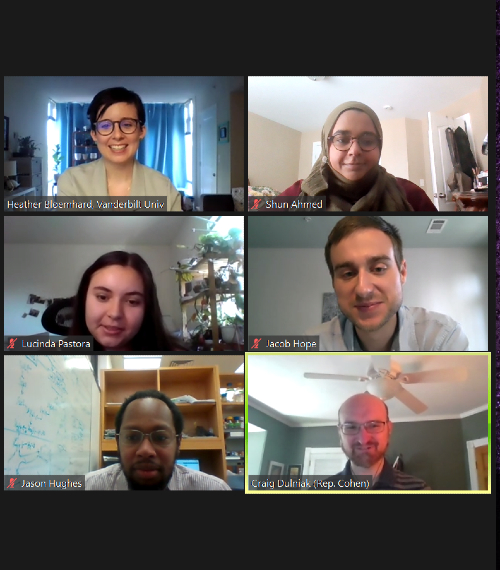By Collier Roberts

Two graduate students from Vanderbilt’s School of Engineering and one from the School of Medicine Basic Sciences recently addressed legislators in Washington, D.C., virtually, sharing stories about the important role funding from the National Science Foundation has played in their research and training.
With guidance from Vanderbilt’s Office of Federal Relations, Lucinda Pastora, a Ph.D. student in chemical and biomolecular engineering; Jacob Hope, a Ph.D. student in biomedical engineering; and Jason Hughes, a Ph.D. student in molecular physiology and biophysics—all recipients of NSF Graduate Research Fellowships—participated in the annual advocacy day on Capitol Hill in tandem with the Coalition for National Science Funding. The CNSF is an alliance of more than 130 professional organizations, universities (including Vanderbilt) and businesses that support the goal of increasing federal investment in the National Science Foundation’s research and education programs in response to the unprecedented scientific, technological and economic opportunities facing the United States.
Also participating in the event was Shun Ahmed, an undergraduate student in computer science, who is interning virtually for the Office of Federal Relations this summer.
“Funding from the NSF has been critical to the training of our graduate students here at Vanderbilt and to our mission to produce cutting-edge research and discovery,” said André Christie-Mizell, dean of the Graduate School. “I am proud of the efforts of our graduate students, who understand this important connection, and their involvement in advocating for increased NSF funding to support their own research and to ensure opportunities for the next generation of scholars.”
The students took part in virtual meetings with staff in the offices of Sens. Marsha Blackburn (R-TN) and Bill Hagerty (R-TN) as well as Reps. Chuck Fleischmann (R-TN03), Jim Cooper (D-TN05) and Steve Cohen (D-TN09). They focused on how the NSF Graduate Research Fellowship has supported their education and research. They also reiterated their hope that the groundswell of bipartisan support for a bold investment in the NSF can be realized through a significant increase in funding in the upcoming fiscal year. Cooper and Cohen also signed on to a letter, at the request of the Office of Federal Relations, urging Congress to appropriate at least $10 billion for the NSF in fiscal year 2022.
“Lucinda, Jason and Jacob did a fantastic job talking about how NSF supports their research and education, and how the impact of that support is amplified across their labs,” said Heather Bloemhard, assistant director of federal relations. “They shared how, because of their fellowships, they are contributing to the expansion of their labs, their PIs can use grant funding on other students, and they have the flexibility to mentor other students.”
“It was an honor to be able to participate in this year’s annual advocacy day on the hill to voice our support for National Science Foundation funding as well as to learn how institutions like Vanderbilt contribute to this endeavor on Capitol Hill,” Hughes said.
In addition to the virtual meetings, the Office of Federal Relations coordinated a social media campaign, featuring videos from Pastora and Hope, to bolster broader efforts to advocate for the NSF.